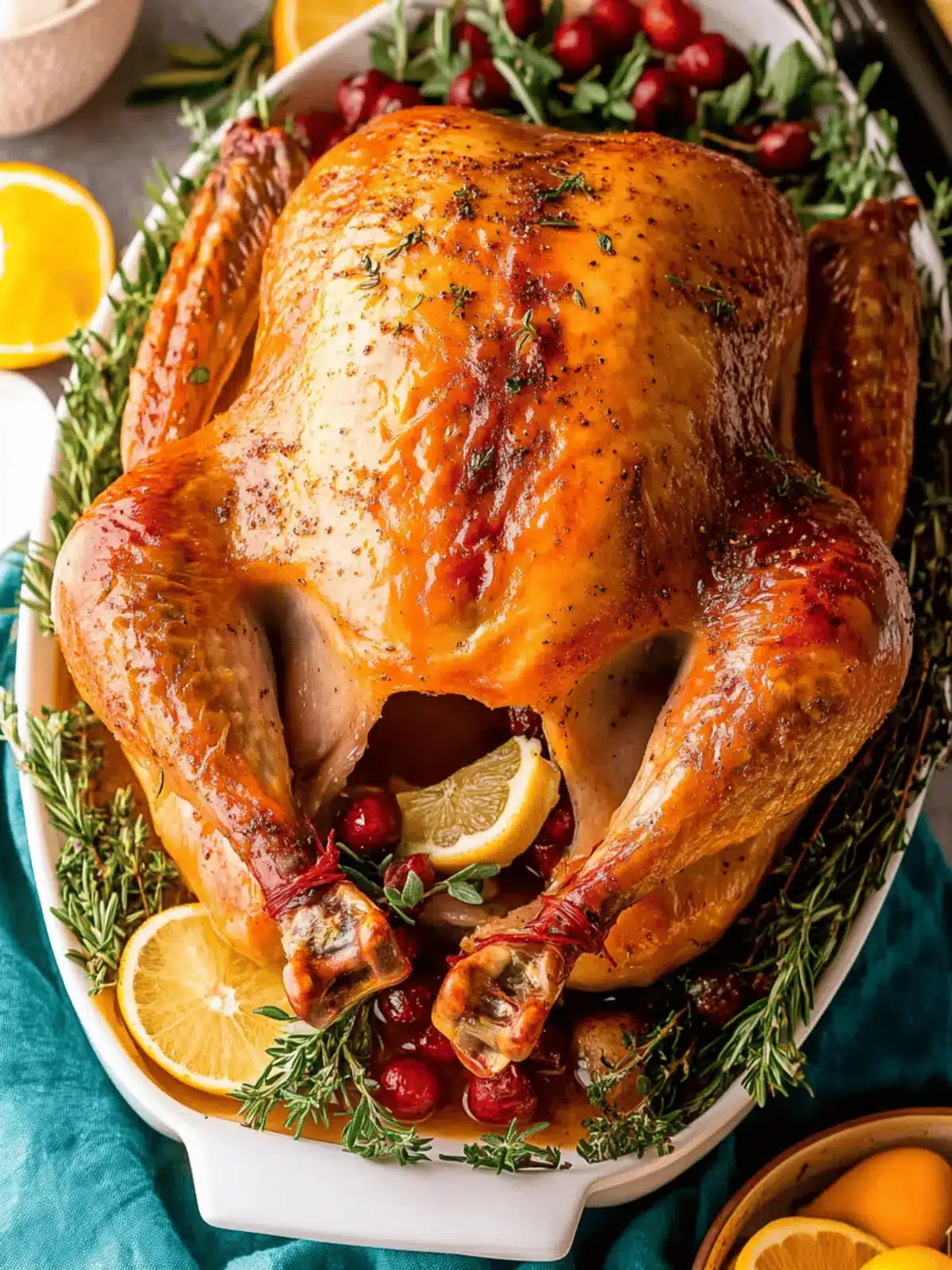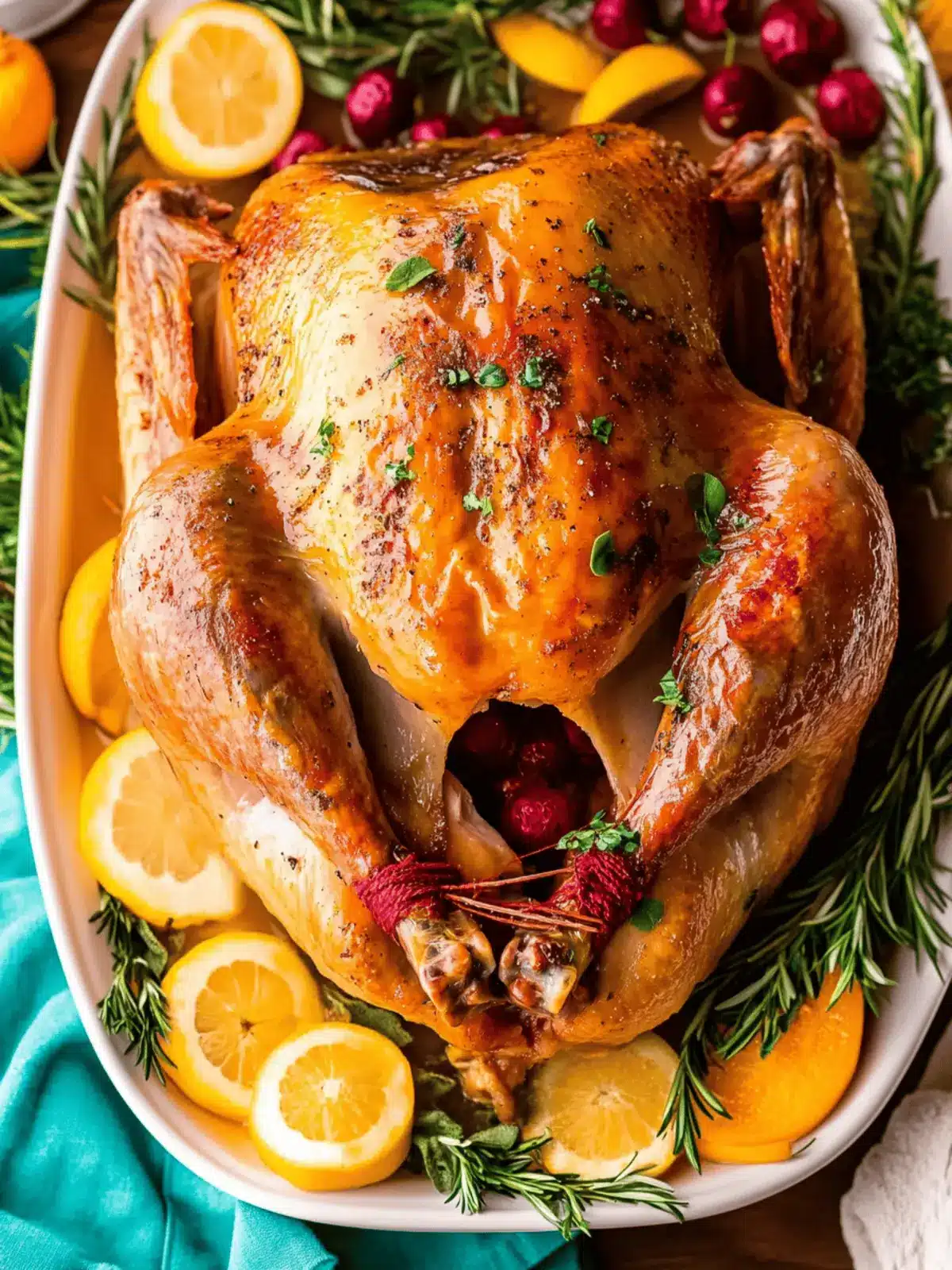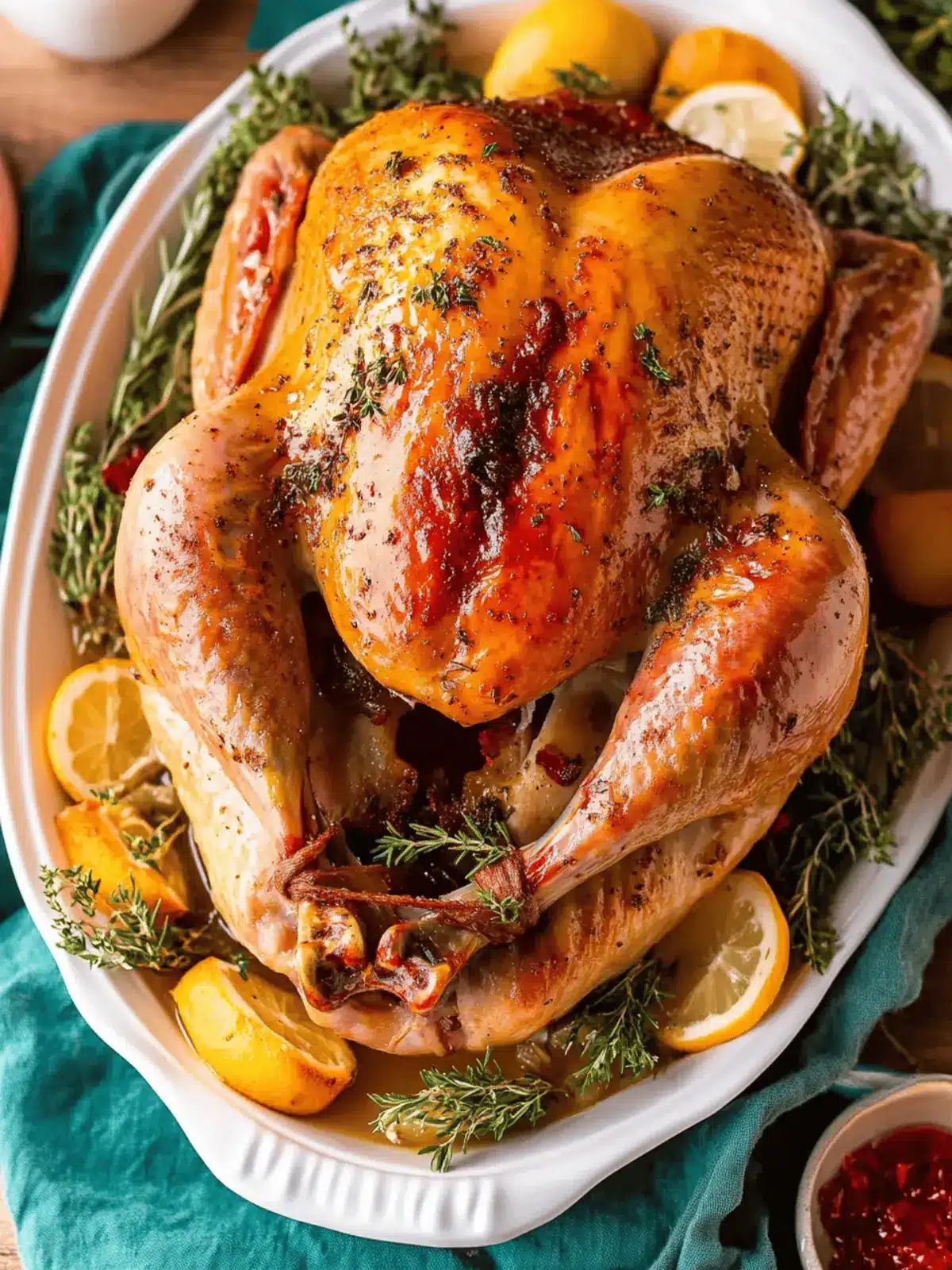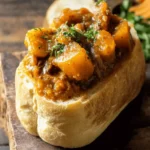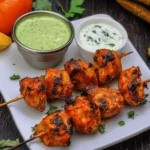As the holiday season approaches, I find myself daydreaming about the warmth of family gatherings and the tantalizing aroma wafting from the kitchen. There’s something deeply satisfying about preparing a Thanksgiving roast turkey that not only wows your guests but fills hearts with joy. This year, I’ve discovered a game-changing technique—a zesty lemon butter injection marinade—that transforms an ordinary turkey into an extraordinary culinary masterpiece. Imagine carving into a beautifully golden-brown bird, revealing juicy, flavorful meat that melts in your mouth.
With just a few simple steps, you can achieve that coveted tender texture and crispy skin, leaving everyone at the table asking for seconds. Whether you’re a seasoned chef or new to roasting, this recipe is designed to impress without overwhelming you. So, let’s dive into the art of creating a Thanksgiving roast turkey that will become a cherished tradition for years to come!
Why is Thanksgiving Roast Turkey so special?
Savor the Flavor: This lemon butter injection delivers a burst of citrus that elevates the turkey’s taste. Each bite is an unforgettable experience.
Effortless Excellence: With an easy-to-follow method, you don’t need to be a culinary expert to create an impressive centerpiece.
Juicy Delight: The marinade ensures that your turkey stays moist and tender throughout the roasting process.
Versatile Variations: While this recipe shines with lemon, feel free to experiment with other citrus fruits or herbs to cater to your taste.
Family Favorite: Not only does this dish impress, but it also creates bellies full of happiness around the table. Your loved ones will be raving about it long after the dinner plates are cleared.
Thanksgiving Roast Turkey Ingredients
For the Turkey
• Whole Turkey – 1 (12-25lb) whole turkey, fresh or thawed; make sure it’s fully thawed for even cooking.
• Chicken Stock – 1 cup; adds moisture and flavor, but vegetable stock can make it lighter.
• Lemon Juice – 2 tablespoons; brings a zesty brightness; lime juice can be an exciting substitution if desired.
• Salted Butter – 4 tablespoons; provides richness and moisture; use unsalted for better control over seasoning.
• Ground Black Pepper – ½ teaspoon; gives warmth; white pepper is a softer alternative if you prefer.
• Ground White Pepper – ½ teaspoon; offers a gentler, aromatic flavor.
• Onion Powder – ⅛ teaspoon; adds depth to the mix; fresh onion may be used but could alter the marinade’s texture.
For Stuffing
• Lemons – 2, halved; enhances flavor and moisture while roasting.
• Granny Smith Apples – 2, quartered; their tartness balances the turkey’s savory profile—any tart apple will work.
• Large White Onion – 1, quartered; sweetens the stuffing; yellow onion serves as a milder option.
• Fresh Thyme Sprigs – 15; infuses herby goodness; dried thyme can be used—adjust to 1 tablespoon.
• Fresh Rosemary Sprigs – 10; offers a wonderful aroma; substitute with 1 tablespoon of dried rosemary if necessary.
• Fresh Sage Sprigs – 10; imparts an earthy flavor; dried sage can be substituted at a 1-to-3 ratio.
For the Dry Rub
• Salt – 1 tablespoon; enhances overall flavor; adjust as needed for taste.
• Ground Black Pepper – 1½ teaspoons; contributes to a flavorful crust—modify to your liking.
• Garlic Powder – ¾ teaspoon; adds a savory touch; fresh garlic can be used for an intense flavor.
• Onion Powder – ¾ teaspoon; brings sweetness alongside the garlic.
Garnish
• Cranberries, Sliced Lemon, and Fresh Herbs – for presentation; these not only beautify the dish but also complement the flavors beautifully.
With these Thanksgiving roast turkey ingredients in hand, you’re well on your way to creating a succulent feast that your loved ones will always remember!
How to Make Thanksgiving Roast Turkey
-
Thaw the Turkey: Ensure your whole turkey is fully thawed. Remove the neck and giblets from the cavity for a seamless roasting process.
-
Simmer the Marinade: In a saucepan, combine chicken stock, salted butter, lemon juice, salt, and spices. Simmer until melted and mixed well. Let cool for about 15-20 minutes.
-
Inject Flavor: Using a meat injector, inject the cooled marinade into the thickest parts of the turkey—focus on the breasts, thighs, and legs for maximum flavor absorption.
-
Marinate: For the best results, marinate your turkey in the refrigerator for at least 2 hours, but ideally overnight. This allows the flavors to penetrate deeply.
-
Stuff the Cavity: Before cooking, stuff the cavity of the turkey with halved lemons, quartered apples, quartered onion, and fresh herbs. This will enhance the flavor as it roasts.
-
Preheat the Oven: Set your oven to 450°F (232°C). This initial high temperature helps to create a crispy skin.
-
Dry and Season: Pat the turkey dry with a paper towel to encourage browning. Rub the dry seasoning mix generously over the skin.
-
Roast: Place the turkey on a roasting rack within a roasting pan. Roast it for 30 minutes at 450°F, allowing the skin to become golden brown.
-
Lower the Temperature: After 30 minutes, reduce the oven temperature to 350°F (177°C). Insert a probe thermometer into the thickest part of the breast and cover the breast loosely with aluminum foil.
-
Final Roast: Continue roasting until the internal temperature reaches 160°F (71°C). Afterward, let the turkey rest for 30-40 minutes before carving to retain its juices.
Optional: Garnish with fresh cranberries, sliced lemon, and herbs for a beautiful presentation.
Exact quantities are listed in the recipe card below.
Storage Tips for Thanksgiving Roast Turkey
- Fridge: Store leftover Thanksgiving roast turkey in airtight containers for up to 4 days. This keeps the turkey fresh while preventing it from drying out.
- Freezer: For longer storage, freeze the leftover turkey in airtight containers or heavy-duty freezer bags for up to 6 months. Ensure as much air is removed as possible to prevent freezer burn.
- Reheating: When ready to enjoy, thaw frozen turkey in the refrigerator overnight. Reheat in an oven preheated to 350°F (177°C) until the internal temperature reaches 165°F (74°C) for optimal juiciness.
- Serving Suggestions: Leftover turkey can be savored in sandwiches, salads, or soups, making it a versatile ingredient following the holiday feast.
Thanksgiving Roast Turkey Variations
Feel free to give your turkey a unique twist with these delightful adaptations!
-
Citrus Twist: Substitute lemon juice with orange or lime juice for a different, zesty flavor profile. Each citrus brings its own brightness to the roast!
-
Herb Infusion: Experiment with fresh herbs like dill or tarragon instead of thyme and rosemary for an aromatic twist. Your turkey will take on a completely new character!
-
Sweet Apple Addition: Mix in some chopped cranberries or pears to the stuffing for a touch of sweetness and a pop of color. You’ll be amazed at how these flavors complement the savory turkey!
-
Spicy Kick: For those who love a bit of heat, add a pinch of cayenne pepper to the injection marinade. Just a little goes a long way in elevating the flavor.
-
Garlic Lovers: Incorporate minced garlic into the marinade for a bold flavor punch. This creates a beautifully savory profile that’s hard to resist!
-
Maple Magic: Drizzle a tablespoon of maple syrup into the butter mixture for a hint of sweetness that perfectly balances the savory elements of your turkey.
-
Nutty Flavor: Add a tablespoon of finely chopped nuts like pecans or walnuts to the stuffing for added crunch and depth. They bring both texture and taste!
-
Smoky Essence: A few drops of liquid smoke mixed into your injection marinade can provide a thrilling smoky flavor that takes your turkey to new heights.
With these variations, your Thanksgiving roast turkey can be as unique as your family traditions!
Make Ahead Options
Preparing your Thanksgiving roast turkey in advance can make your holiday cooking experience much smoother! You can inject the marinade up to 24 hours ahead of time, allowing the flavors to penetrate even deeper. Simply prepare the lemon butter injection marinade and inject it into the turkey, sealing it tightly in the refrigerator. For the best results, marinate the turkey overnight, ensuring it stays covered to maintain moisture and prevent contamination. On the day of cooking, stuff the turkey with the citrus and herbs just before roasting; this will keep it fresh and flavorful. You’ll enjoy a hassle-free cooking session, resulting in a delicious, moist turkey that impresses everyone at your Thanksgiving table!
What to Serve with Thanksgiving Roast Turkey?
As you prepare for the festive feast, consider delightful side dishes that will elevate your celebration and complement the juicy flavors of the turkey.
- Creamy Mashed Potatoes: The velvety texture of mashed potatoes pairs beautifully with roasted turkey, providing a comforting contrast to its savory, zesty flavor.
- Green Bean Casserole: This classic dish introduces a crunchy texture and a savory depth that rounds out the meal while ensuring the holiday spirit is alive.
- Cranberry Sauce: The tart sweetness of homemade cranberry sauce cuts through the richness of the turkey and adds a refreshing bite, brightening each mouthful.
- Stuffing: A hearty stuffing filled with herbs and spices captures the essence of Thanksgiving, soaking up that flavorful turkey gravy for ultimate satisfaction.
- Roasted Brussels Sprouts: Their crispy exterior and nutty flavor add a delightful crunch to the dinner table while balancing the meal’s heaviness.
- Pumpkin Pie: No Thanksgiving feast is complete without dessert! The sweet and spiced profile of pumpkin pie offers a cozy finish to your meal.
- Apple Cider: This drink, with its warm spices, enhances the flavors of the turkey and creates a jubilant ambiance during your gathering.
- Garlic Bread: With its buttery and aromatic crunch, garlic bread serves as a delightful vessel for sopping up any leftover gravy or sauce.
- Cauliflower Gratin: Creamy and cheesy, this dish gives a comforting texture that complements the crispy skin of the turkey while adding a rich flavor.
- Herbed Rice Pilaf: Light yet flavorful, this side dish provides a soft and fragrant option that pairs well with the turkey’s juicy goodness and makes for a unique touch.
Expert Tips for Thanksgiving Roast Turkey
- Thermometer Essentials: Always use a probe thermometer instead of pop-up timers for accurate internal temperature readings. Pull the turkey at 160°F for optimal juiciness.
- Resting Period: Don’t skip the resting! Allow the turkey to rest for 30-40 minutes post-roasting to let the juices redistribute, ensuring moist meat.
- Immediate Injection: Use the marinade right after preparing. If cooled too long, the butter hardens, making it difficult to inject effectively.
- Poking Holes: If you don’t have a meat injector, a fork or metal skewer can be a great alternative. Poke holes in the turkey before marinating for even flavor distribution.
- Citrus Variations: Feel free to experiment with other citrus fruits like oranges or limes in your injection marinade for a unique twist on Thanksgiving roast turkey.
- Herbal Infusions: Enhance flavor by mixing up your herb choices—try dill or tarragon in the marinade for an interesting flavor profile!
Thanksgiving Roast Turkey Recipe FAQs
What’s the best way to select a turkey for roasting?
Absolutely! When selecting a turkey, look for one that feels heavy for its size with firm, unblemished skin. Avoid any that have dark spots or an unpleasant odor. Fresh turkeys can often be preferred over frozen ones for flavor, but if you choose frozen, ensure it’s fully thawed before cooking.
How should I store leftover turkey?
You can store leftover Thanksgiving roast turkey in airtight containers in the refrigerator for up to 4 days. For longer storage, freeze it in heavy-duty freezer bags or airtight containers for up to 6 months. Just remember to remove as much air as possible to prevent freezer burn!
Can I freeze the turkey after injecting it with the marinade?
While it’s best to cook the turkey after marinating, you can freeze an injected turkey if necessary. Make sure it’s wrapped securely to avoid freezer burn. When you’re ready to cook it, thaw it in the refrigerator for 24 hours before roasting, and don’t refreeze it after thawing.
What should I do if my turkey skin isn’t crispy?
Very! If your turkey skin isn’t crispy by the time it’s done cooking, try increasing the oven temperature for the last 15-20 minutes of roasting. Just keep an eye on it to avoid burning! Another tip is to ensure the turkey is patted dry before applying any seasoning, as moisture can hinder crispiness.
What if I have allergies to certain ingredients?
If you or your guests have allergies, always opt for ingredient substitutions. For example, use gluten-free chicken stock if someone is gluten intolerant or replace butter with olive oil for a dairy-free option. You can also use herbs and seasonings that align with dietary restrictions, ensuring everyone can enjoy a delicious slice!
How can I make sure my turkey is moist and flavorful?
To ensure a mouthwatering, moist turkey, remember to inject the marinade into the thickest parts, such as the breasts and thighs. Allow the turkey to marinate for at least 2 hours—overnight is even better! During roasting, use a meat thermometer to check for an internal temperature of 160°F (71°C), followed by a resting period of 30-40 minutes for juiciness before carving.
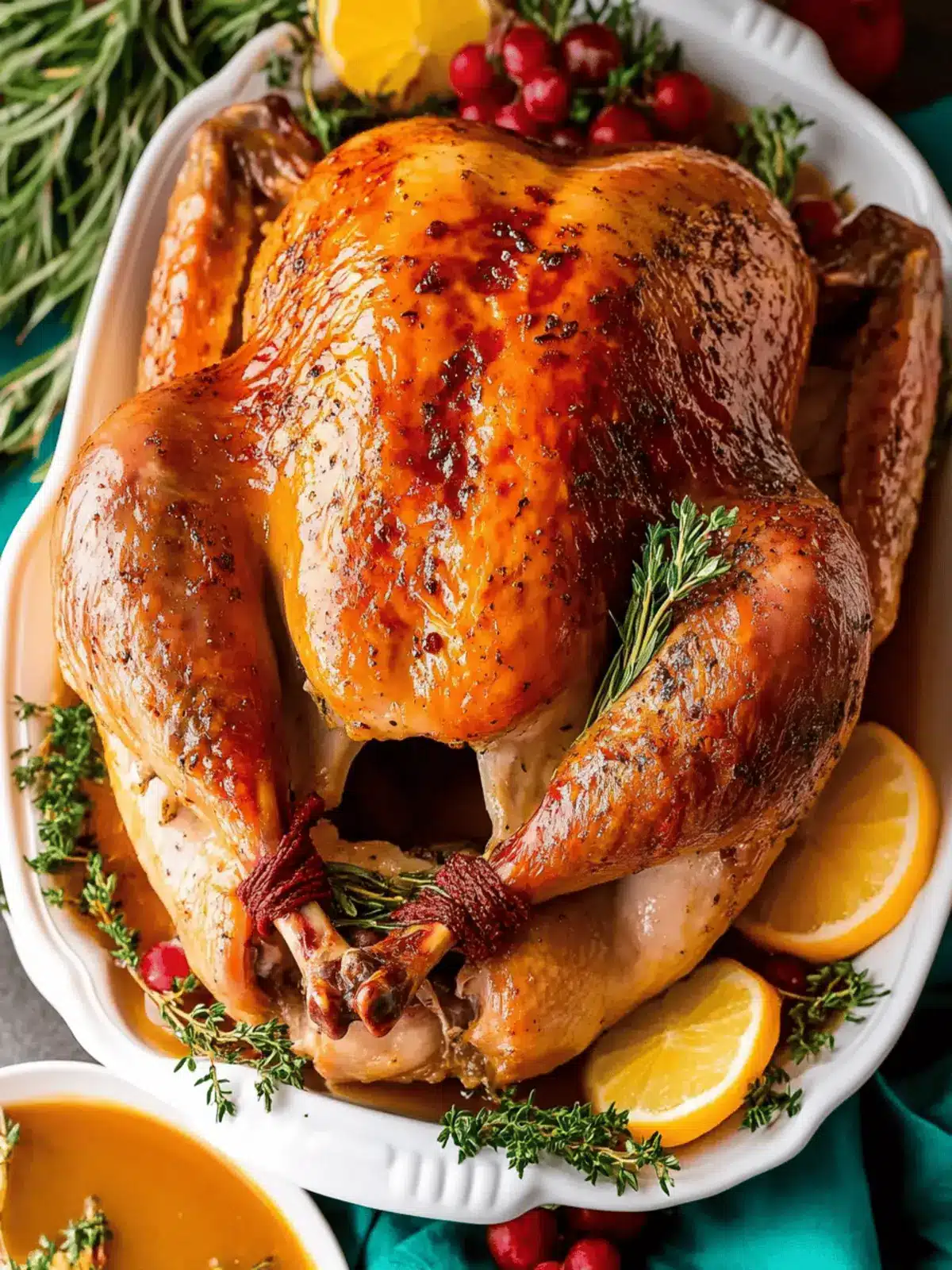
Thanksgiving Roast Turkey with Zesty Lemon Butter Injection
Ingredients
Equipment
Method
- Thaw the Turkey: Ensure your whole turkey is fully thawed. Remove the neck and giblets from the cavity.
- Simmer the Marinade: Combine chicken stock, salted butter, lemon juice, salt, and spices in a saucepan. Simmer until melted and mixed well. Let cool for 15-20 minutes.
- Inject Flavor: Using a meat injector, inject the cooled marinade into the thickest parts of the turkey.
- Marinate: Marinate your turkey in the refrigerator for at least 2 hours, ideally overnight.
- Stuff the Cavity: Stuff the cavity of the turkey with halved lemons, quartered apples, quartered onion, and fresh herbs.
- Preheat the Oven: Set your oven to 450°F (232°C).
- Dry and Season: Pat the turkey dry and rub the dry seasoning mix generously over the skin.
- Roast: Place the turkey on a roasting rack in a pan. Roast for 30 minutes at 450°F until golden brown.
- Lower the Temperature: After 30 minutes, reduce the oven temperature to 350°F (177°C) and cover the breast loosely with aluminum foil.
- Final Roast: Roast until the internal temperature reaches 160°F (71°C). Let the turkey rest for 30-40 minutes before carving.

